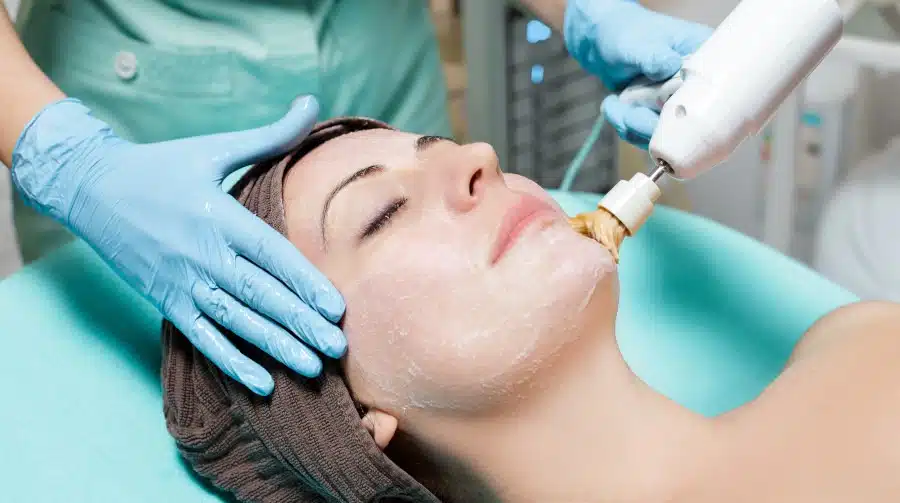These treatments are a great way to reduce the appearance of acne scarring, dark spots, deeper wrinkles, and dry skin. Peels and microdermabrasion involve removing the outer layers of skin to reveal healthier-looking skin underneath for a more youthful appearance. The most common type of peel is a chemical peel treatment which involves applying lactic acid or other acids to the surface of the skin. This can be done in different strengths depending on your desired results and the sensitivity of your skin. For those with sensitive skin, lighter peels can be used that will still effectively treat issues such as acne scars or dark spots. For more serious concerns such as deeper wrinkles or sun damage, a deep chemical peel may be necessary to achieve greater results. Another popular option is microneedling which involves using tiny needles to penetrate through layers of the surface of the skin to stimulate the production of collagen for smoother skin texture and tone. With careful consideration and understanding these treatments can produce amazing results!
- Understanding Chemical Peels
- Types of Chemical Peels
- The Benefits of Chemical Peels
- What is Microdermabrasion?
- The Benefits of Microdermabrasion
- Chemical Peels vs. Microdermabrasion: Which is Right for You?
- Preparing for Your Treatment
- What to Expect During Recovery
- Finding a Skin Care Specialist in New Jersey
- Conclusion
- Frequently Asked Questions about Microdermabrasion
Understanding Chemical Peels
Chemical peels are a type of cosmetic treatment that uses a chemical solution to remove the outer layer of your skin. This process helps to reveal the newer, healthier skin underneath. It’s like giving your skin a fresh start, stripping away the old, damaged skin cells to reveal the fresh, healthy ones underneath.
Chemical peels work by causing a controlled injury to the layers of the skin, which prompts the body to heal and renew the skin. The type of chemical peel you choose will determine how deep the peel penetrates and what issues it can address.
Types of Chemical Peels
Each type uses a different chemical solution and penetrates the skin to a different depth.
- Superficial peels are the mildest type of chemical peel. They use mild acids like alpha-hydroxy acids to gently exfoliate the outermost layer of the skin. Superficial peels are a good choice for treating fine wrinkles, acne, uneven skin tone, and dryness.
- Medium peels are a type of skin treatment that works by reaching and exfoliating both the outer and middle layers of the skin, effectively eliminating damaged skin cells. The substances typically used in these peels are trichloroacetic acid or glycolic acid. These peels are particularly effective in addressing a variety of skin issues, including wrinkles, acne scars, and uneven skin tone.
- Deep peels penetrate the deeper layers of the skin and can remove moderate lines, age spots, and scars. They typically use phenol or trichloroacetic acid. Because they penetrate deeper into the skin, deep peels require more recovery time.
The Benefits of Chemical Peels
Chemical peels can help to improve a variety of skin conditions, including acne scars, age spots, and sun damage. They can also stimulate collagen production, helping keep your skin youthful and firm.
By removing the outer layer of dead skin cells, chemical peels can also improve the effectiveness of your skincare products, allowing them to penetrate deeper into the skin. This can lead to improved skin texture and tone, reduced pore size, and a brighter complexion.
What is Microdermabrasion?
Microdermabrasion is a non-invasive procedure that uses tiny crystals to exfoliate and remove the outer layer of dry, dead skin cells. It’s like using very fine sandpaper to smooth the surface of your skin.
During a microdermabrasion treatment, a handheld device is used to spray tiny crystals onto the skin. These crystals are then vacuumed away along with the dead skin cells, leaving the skin looking brighter and feeling smoother.
The Benefits of Microdermabrasion
Like chemical peels, microdermabrasion can help to improve a variety of skin conditions. It can also stimulate collagen production and improve your skin’s texture and appearance.
Microdermabrasion is a versatile treatment that can address various skin concerns such as fine lines, wrinkles, sun damage, acne and acne scars, enlarged pores, and uneven skin tone. Additionally, it can improve dull skin, resulting in a brighter complexion and a more youthful look.

Chemical Peels vs. Microdermabrasion: Which is Right for You?
While both chemical peels and microdermabrasion can improve the appearance of your skin, the best treatment for you will depend on your specific skin concerns and goals.
If you’re dealing with deep wrinkles, significant sun damage, or severe acne scars, a chemical peel may be the best option for you. On the other hand, if you’re looking to brighten your complexion, reduce the appearance of fine lines, or improve the texture of your skin, microdermabrasion might be a better fit.
Preparing for Your Treatment
Before undergoing a chemical peel or microdermabrasion, it’s important to prepare your skin and understand what to expect during the procedure.
In the weeks leading up to your treatment, you may be advised to stop using certain skincare products, such as retinoids, which can increase your skin’s sensitivity. You should also avoid sun exposure, which can increase your risk of complications.
What to Expect During Recovery
The recovery process for both chemical peels and microdermabrasion will depend on the type of treatment you receive and your skin type.
After a chemical peel, you can expect your skin to be a bit swollen and sensitive for a few days. You may also experience some peeling or flaking as the old skin is shed. After microdermabrasion, your skin may be slightly red and swollen, but these side effects typically subside within a few hours.
Finding a Skin Care Specialist in New Jersey
If you’re considering a chemical peel or microdermabrasion, it’s important to find a qualified skin care specialist in New Jersey who can help you achieve your skincare goals.
Look for a board-certified dermatologist or plastic surgeon who has experience with these treatments. They can assess your skin type and concerns and recommend the best treatment.
Conclusion
Chemical peels and microdermabrasion are powerful tools in the fight against common skin conditions. By understanding these treatments and finding a qualified skin care specialist in New Jersey, you can take the first step towards healthier, more radiant skin.
Why Choose Dr. Nicole Schrader
When considering a facelift procedure, it is essential to choose a skilled and experienced surgeon who specializes in facial plastic and reconstructive surgery. Dr. Nicole Schrader is a double board-certified surgeon with over 20 years of experience, including 13+ years in private practice. Her expertise and qualifications include:
- Specializing in Facial Plastic and Reconstructive Surgery and Otolaryngology (Ear, Nose, and Throat Specialty) & Head/Neck Surgery
- Member of the American Academy of Facial Plastic and Reconstructive Surgery, the American Academy of Otolaryngology and Head and Neck Surgery, and the American Board of Otolaryngology
- Graduated summa cum laude from George-August University in Germany
- Completed a residency in Otolaryngology – Head and Neck Surgery at Temple University in Philadelphia and a fellowship in Facial Plastic & Reconstructive Surgery at Robert Wood Johnson, New Brunswick, NJ
- Recognized as the Best Plastic Surgeon by Town Topics Readers’ Choice Awards in 2017
- Co-authored more than a dozen papers and presentations
By choosing Dr. Schrader for your facelift procedure, you can trust that you are in the hands of a highly skilled and experienced surgeon, dedicated to providing the highest quality care and achieving the best possible results.
Click here to request your consultation with Dr. Schrader.

